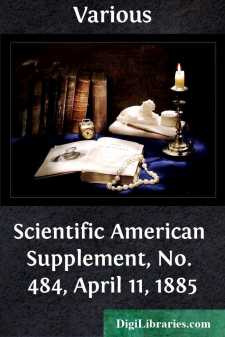Categories
- Antiques & Collectibles 13
- Architecture 36
- Art 48
- Bibles 22
- Biography & Autobiography 813
- Body, Mind & Spirit 142
- Business & Economics 28
- Children's Books 14
- Children's Fiction 11
- Computers 4
- Cooking 94
- Crafts & Hobbies 4
- Drama 346
- Education 46
- Family & Relationships 57
- Fiction 11828
- Games 19
- Gardening 17
- Health & Fitness 34
- History 1377
- House & Home 1
- Humor 147
- Juvenile Fiction 1873
- Juvenile Nonfiction 202
- Language Arts & Disciplines 88
- Law 16
- Literary Collections 686
- Literary Criticism 179
- Mathematics 13
- Medical 41
- Music 40
- Nature 179
- Non-Classifiable 1768
- Performing Arts 7
- Periodicals 1453
- Philosophy 64
- Photography 2
- Poetry 896
- Political Science 203
- Psychology 42
- Reference 154
- Religion 513
- Science 126
- Self-Help 84
- Social Science 81
- Sports & Recreation 34
- Study Aids 3
- Technology & Engineering 59
- Transportation 23
- Travel 463
- True Crime 29
The Atlantic Monthly, Volume 12, No. 71, September, 1863
by: Various
Categories:
Description:
Excerpt
THE PURITAN MINISTER.
It is nine o'clock upon a summer Sunday morning, in the year sixteen hundred and something. The sun looks down brightly on a little forest settlement, around whose expanding fields the great American wilderness recedes each day, withdrawing its bears and wolves and Indians into an ever remoter distance,—not yet so far but that a stout wooden gate at each end of the village street indicates that there is something outside which must stay outside, if possible. It would look very busy and thriving in this little place, to-day, but for the Sabbath stillness which broods over everything with almost an excess of calm. Even the smoke ascends more faintly than usual from the chimneys of these abundant log-huts and scanty framed houses, and since three o'clock yesterday afternoon not a stroke of this world's work has been done. Last night a preparatory lecture was held, and now comes the consummation of the whole week's life, in the solemn act of worship. In which settlement of the Massachusetts Colony is the great observance to pass before our eyes? If it be Cambridge village, the warning drum is beating its peaceful summons to the congregation. If it be Salem village, a bell is sounding its more ecclesiastic peal, and a red flag is simultaneously hung forth from the meeting-house, like the auction-flag of later periods, but offering in this case goods without money and beyond price. But if it be Haverhill village, then Abraham Tyler has been blowing his horn assiduously for half an hour, a service for which Abraham, each year, receives a half-pound of pork from every family in town.
Be it drum, bell, or horn, which gives the summons, we will draw near to this important building, the centre of the village, the one public edifice,—meeting-house, town-house, school-house, watch-house, all in one. So important is it, that no one can legally dwell more than a half-mile from it. And yet the people ride to meeting, short though the distance be, for at yonder oaken block a wife dismounts from behind her husband;—and has it not, moreover, been found needful to impose a fine of forty shillings on fast trotting to and fro? All sins [pg 266] are not modern ones, young gentlemen.
We approach nearer still, and come among the civic institutions. This is the pillory, yonder the stocks, and there is a large wooden cage, a terror to evil-doers, but let us hope empty now. Round the meeting-house is a high wooden paling, to which the law permits citizens to tie their horses, provided it be not done too near the passage-way. For at that opening stands a sentry, clothed in a suit of armor which is painted black, and cost the town twenty-four shillings by the bill. He bears also a heavy matchlock musket; his rest, or iron fork, is stuck in the ground, ready to support the weapon; and he is girded with his bandoleer, or broad leather belt, which sustains a sword and a dozen tin cartridge-boxes.
The meeting-house is the second to which the town has treated itself, the first having been "a timber fort, both strong and comely, with flat roof and battlements,"—a cannon on top, and the cannonade of the gospel down below....












